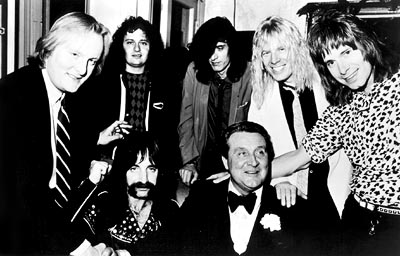IxIzM0oEtwI]
I’ve never heard anyone who’s seen The Kinks live say they were a great live band. I’ve never seen them myself because dating back to my high school days, when they were at their suprising arena-rock height and I’d hear live concerts of them, they never sounded like they’d deliver anything near what I loved about them on record, in the privacy of my bedroom. Then, into the early ’80s, they started making albums that didn’t interest me in the least – and from concert recordings I’d hear from that period they had the nerve to stand behind those new songs and play them live.
F4DV-5d6a5g]
As video evidence of my favorite rock bands became more accessible in the ’80s, even early performances of The Kinks with all their British Invasion exhuberance were unwhelming. There are many reasons for why The Kinks have never been known as anything more than a mediocre live band, but from what I’ve seen the reasons start with Ray Davies. He’s too self-conscious. The humor of The Kinks is in the music; he doesn’t need to play it up with the goofy hand gestures (see the 40-second mark of the above clip, where Ray’s pointless holstering and gesturing first kick in) and “Banana Boat Song” call-and-response nonsense. That stuff almost always takes me out of the performance and undercuts the ambiguities inherent in their music. It doesn’t help that Ray seems incapable of smiling without smirking.
Meanwhile, the poignancy of The Kinks’ music often gets lost in their live performances. That 1977 clip that Townsman misterioso provided of The Kinks playing “Celluloid Heroes” on British television was surprisingly straightforward and appropriately reserved, but too often, from what I’ve seen and heard, Ray can’t step forward as a clear, confident lead singer on a sensitive song and the band can’t lay back and support things in a subtle, interesting way to make what I feel is the heart of the sound of The Kinks work in a live setting. Am I way off base here; does any of this ring true?
I should note that there is ample video evidence of The Kinks lip-synching to their greatest, most poignant songs, and they demonstrate great skill at this then-nascent rock ‘n roll act. I’m not kidding – and this may be saying something that will help answer the question for you at the end of this piece.
fvDoDaCYrEY]
Before we get into the question I have for you, here’s an interesting clip I’d never seen before today. Ray is sans guitar and energetically fronting a full-title boogie band version of The Kinks, from a 1972 television show, if I’m getting this right. The clip even comes with the magical timecode that, in my opinion, makes any video at least two degrees cooler.
Continue reading »



